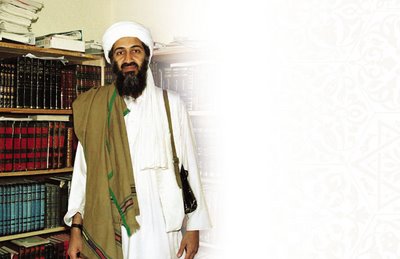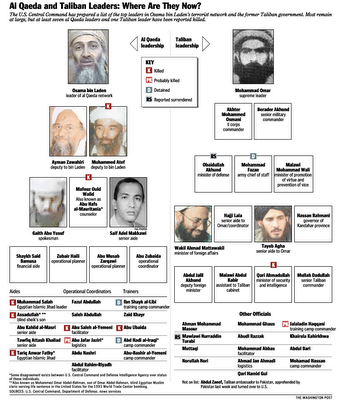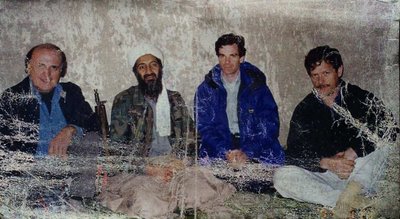Bush Administration's First Memo on al-Qaeda Declassified

Volume I - Terrorism and U.S. Policy
“…The September 11, 2001 terrorist attacks on the World Trade Center and the Pentagon and the abortive attack (possibly aimed at the White House or Camp David) that resulted in the crash of a jetliner in Pennsylvania has resulted in a new and extraordinary emphasis by the Bush administration on combating terrorism. During the last ten days key administration officials, particularly President Bush, Secretary of Defense Donald Rumsfeld, and Secretary of State Colin Powell, have repeatedly emphasized that their long-term objective is the destruction of terrorism – a goal to be achieved by the death or apprehension of terrorists, the destruction of their infrastructure and support base, and retaliation against states that aid or harbor terrorists…”
Volume II - Afghanistan: Lessons from the Last War
“…On October 7, the United States launched an attack against targets in Afghanistan in the beginning of what President Bush has promised will be a long campaign against terrorist groups and the states that support them. In response to these events, the National Security Archive offers the second volume of a series called The September 11th Sourcebooks. In this installment, Archive experts John Prados and Svetlana Savranskaya draw on declassified records and the memoirs of former Soviet officials to examine Soviet policymaking, military operations, and lessons learned from the last war in Afghanistan, a bloody, ten-year conflict that pitted Soviet military forces against CIA-backed Afghan rebels. The collection also includes excerpts from an essay written by analyst Steve Galster as an introduction to the Archive's microfiche collection, Afghanistan: The Making of U.S. Policy, 1973-1990, published in 1990…”

Volume III - BIOWAR
“…Perhaps the most troubling and terrifying development in the wake of the terrorist attacks of September 11th is the emergence of biological warfare as a real, instead of a potential, threat for our government and the public to confront. To provide the historical context for this new threat, the National Security Archive published on October 25, 2001 key declassified documents on President Richard Nixon's decision to halt the U.S. biological warfare program. In this updated briefing book, the Archive is making available the official history of the U.S. Army's activities in the U.S. biological weapons program (see Document No. 26). New revelations in the news now make this history even more vital to understand, since the mailed anthrax that has killed five Americans in recent weeks may have come from the U.S. program, not from foreign sources. According to William Broad in The New York Times (December 3, 2001)...”
Volume IV - The Once and Future King?
“…Now living in exile outside of Rome, 87-year old Zahir Shah reigned as king of Afghanistan from 1933 until July 1973, when his cousin, prince Mohammed Daoud Khan, seized power and proclaimed a republic. Daoud was subsquently overthrown and killed in a 1978 military coup that produced a Soviet client state. A year and a half later, in December 1979, Soviet troops invaded Afghanistan setting off a ten-year war.(1) Throughout the Afghan conflict of the 1980s, proposals to revive the Zahir Shah regime figured in to discussions of a post-war political system. Those discussions of the "Zahir Shah option" never went far, in part because of the opposition of religious fundamentalists and Islamists who had chafed under modernization reforms that took place during the king's reign. Zahir Shah's contacts with the Indian government in 1988 also hurt his cause.(2)…"

Volume V - Anthrax at Sverdlovsk, 1979
“…As noted in Biowar: The Nixon Administration's Decision to End U.S. Biological Warfare Programs, public attention has become intensely focused upon the threat of attack by biological agents, as the continuing reports of anthrax-contaminated mail facilities and congressional offices appear in the news. The effort to determine who sent the anthrax-laced letters, how they have managed to become so widely dispersed, and to come to grips with the health threat posed have revealed the uncertainties surrounding any such outbreak…”
Volume VI - The Hunt for Bin Laden
“…The latest phase of military operations in Afghanistan has shifted the emphasis from heavy bombing to more of a “boots on the ground” approach involving hundreds of U.S. special forces units with missions ranging from engaging Al-Qaeda fighters, to interrogating prisoners, guarding sensitive positions and, soon, possibly searching the Tora Bora caves…” U.S. Pressed Taliban to Expel Usama bin Laden Over 30 Times
The Taliban File Part III
“…Pakistan Provided Millions of Dollars, Arms, and "Buses Full of Adolescent Mujahid"… to the Taliban in the 1990's…”
The Taliban File Part IV
“…he U.S. Ambassador to Pakistan told a top Taliban official in September 2000 that the U.S. "was not out to destroy the Taliban," but the "UBL [Osama bin Laden] issue is supremely important," according to declassified documents posted today by the National Security Archive. The documents, obtained through the Freedom of Information Act, show how years of U.S. diplomacy with the Taliban, combined with pressure on Pakistan, and attempts to employ Saudi cooperation still failed to compel the Taliban to expel bin Laden…”
Pre-9/11 U.S. Attempts to Drive Bin Laden Out of Afghanistan
“…Mullah Omar, the Taliban's supreme leader, initiated a phone call to Washington - his only known direct contact with U.S. officials - two days after President Clinton sent cruise missiles to destroy Osama bin Laden's terrorist training camps in Afghanistan in 1998, according to newly-obtained documents posted on the Web by the National Security Archive… According to the documents, obtained through the Freedom of Information Act, Omar denied knowing of any "evidence that bin Laden had engaged in or planned any terrorist acts while on Afghan soil." [Doc 2]. The U.S. State Department responded by providing evidence of bin Laden's terrorist activities in one of ultimately thirty-three contacts with the Taliban, thirty by the Clinton administration and three by the Bush administration before 9/11. All diplomatic attempts to get the Taliban to extradite Osama bin Laden ultimately failed…"

No hay comentarios.:
Publicar un comentario